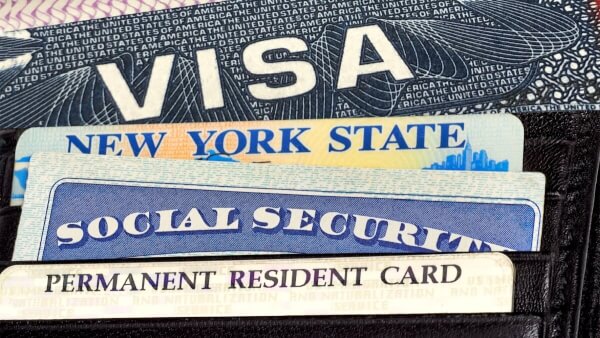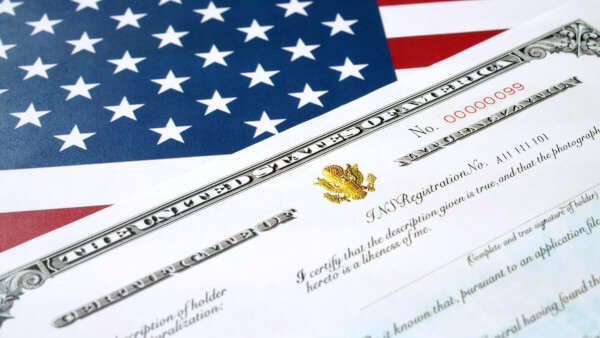Transferring your international driver's license to the US: step-by-step
Your full guide to updating your foreign driver's license to the US.

If you’re on the journey to becoming an American citizen by naturalization, and have submitted your N-400 form, one of the next steps you’ll need to take is to attend a USCIS interview which will include the US citizenship test.
This guide runs through how to find the citizenship test questions you should prepare, and what happens after the USCIS citizenship test.
We’ll also touch on a smart way to save money when you live an international lifestyle, with Wise.
An important step in the process to naturalization as a US citizen is your naturalization interview¹. You’ll meet with a USCIS officer, and will need to talk through your application, your background and why you’re applying to become a US citizen. You’ll also need to show you understand your responsibilities as a US citizen, are willing to uphold the constitution, and will be prepared to take an oath of allegiance once your application is approved.
In most cases you’ll also take a naturalization test — commonly known as the USCIS citizenship test — which is broken down into 2 parts:
1. English proficiency test
2. Civics (history and government)
The English test is designed to show you can read, write and speak basic English, while the Civics test covers questions about American government and history.
While most people applying to naturalize as a US citizen must take the citizenship tests, there are some exceptions²:
If you’re aged 50 at the time of applying for US citizenship, and have been living as a US permanent resident for at least 20 years, you may be exempted from the English language test (the 50/20 exception). The same rule may apply if you’re 55 when you submit your naturalization application, and you’ve been a Green Card holder for at least 15 years (the 55/15 exception). In both cases you still need to take the civics test — although it might be possible to do this in your mother tongue.
If you’re aged over 65 at the time of applying, and have been a US permanent resident for 20 years or more you may be exempt from the English test and have some accommodation within the Civics test. This usually means you have fewer potential questions to revise in advance, although you still need to take the test.
Further exemptions and accommodations are available on the grounds of disability. You’ll have to make an application to be eligible for these accommodations, and describe the reasons for requiring amendments to the process.
We’ll dive deeper into how the citizenship test works in just a moment. First let’s start with some smart tips on how to prepare for your US citizenship interview and test.
|
|---|
|
|---|
After taking the citizenship test the presiding USCIS officer will decide to either approve, continue or deny your application for citizenship. If your application is continued this may mean the officer needs more information, or you’ve missed an important document from your paperwork. If this is the case you’ll be told how to proceed, which documents or information is lacking, and how to rectify the situation. You’ll usually have 30 days to provide the missing detail or document, to have your case properly assessed and approved.
But what happens if you miss the marks on either the English or civics portion of the US citizenship test?
If you don’t pass either portion of the US citizenship test, you are offered the opportunity to retake the test between 60 and 90 days after your first attempt. You may also be eligible to use the 2020 version of the civics test instead of the 2008 version — this is covered in a little more detail below. You’ll only have to retake the portion of the test you failed.
If you fail the test a second time your citizenship application will be denied.
It’s worth noting that there is also the possibility that your application will be denied on the first interview. This is not a common outcome, and usually means there is a bar to your application, such as a recorded crime which makes you ineligible to apply, or problems with your tax records. You can request an appeal if your application is denied, although it’s advisable to seek professional advice from an immigration lawyer if you’re going to do this¹.
Let’s take a look in more detail at how the US citizenship test works.
To pass the English test you’ll need to be able to read, write and speak in basic English. The USCIS officer will determine your ability to speak English based on the answers you give in the interview overall — there is no separate speaking test.
To demonstrate you can read English you’ll need to correctly read at least 1 of 3 sentences given to you. You can find a full vocabulary list on the USCIS website³, along with a helpful preparation handbook⁴.
To pass the writing element, you’ll also need to be able to correctly write out one of 3 sentences given to you by the USCIS officer. Find the full writing vocabulary which you need to know in the USCIS website⁵ or in the preparation handbook.
The civics test is split into sections, covering:
| Section | Content |
|---|---|
| Government |
|
| American history |
|
| Integrated civics |
|
USCIS has a range of study materials available online. You can find a list of the 100 civics (history and government) questions⁶ below. On the USCIS you can find study guides and details for people taking the 2008 or 2020 versions of the test. Check which version of the test you’re expected to take — at the time of writing the standard is to use the 2008 test⁷ for N-400 applicants at their first interview. The 2020 test version⁸ is made available for N-336 candidates or some people attending a re-hearing. This has come about after the Biden administration made changes to the system in place during President Trump’s tenure — further changes to the system are to be expected down the line.
On the day of your civics test you’ll be asked 10 of the possible 100 questions by the USCIS officer assessing your application. Within the study guides provided by USCIS there are model answers — and these will be the answers the USCIS officer needs to hear. Although for some questions there are several possible ways to respond, it’s important to use the answers given in the preparation resources for your best chance of success.
It’s also important to make sure that you’re using the most recent resources when you prepare. Some of the answers may change due to government policy changes or election outcomes.
To pass the test you’ll need to answer at least 6 of the 10 questions asked to the satisfaction of the presiding USCIS officer.
| 💡 If you send or receive international payments you could save with Wise and the Wise Multi-currency Account. |
|---|
|
|---|
Create a free Wise account now
---The US citizenship test is a big event — so it’s natural to have questions. There are many resources out there to help you, so drawing on these to prepare and maximize your chances of success is a smart move. We’ve rounded up some of the most common concerns and questions here to get you started.
The citizenship test is split into English proficiency and civics sections. In the English test you will need to be able to read at least one of 3 sentences given correctly — and accurately write at least one of 3 sentences provided by the USCIS officer. You’ll also need to demonstrate an ability to speak basic English during the test as a whole.
In the US citizenship civics test there are 100 possible questions. The USCIS officer will ask you 10 of them, and you must correctly answer at least 6 to pass.
There isn’t a dress code for your naturalization interview as such. You’ll want to strike a balance between being comfortable and professional — business casual is a good aim here. If wearing a suit makes you feel more confident, go for it — if not, choose something professional looking, and avoid denim, sneakers or anything which makes it look like you’re not taking the occasion seriously.
In the civics section you must get 6 of the 10 questions answered correct — that makes the pass score 60%.
The USCIS officer may be able to tell you immediately if you have passed the test. However, this doesn’t always happen, as sometimes they will decide to continue your case, to seek further evidence for example. In any case, you’ll be given Form N-652, Naturalization Interview Results, which will tell you your application was granted, continued or denied.
If you’re told you have passed the interview and test, you’ll still need to take your oath to formally become a US citizen.

Below you can find the complete list of questions and correct answers for the US civics citizenship test.
Note: if you’ve been a legal permanent of the US for 20 or more years, or are 65 years old (or older), you can study just the questions marked by an asterisk (*).
| Question | Answer |
|---|---|
| Segment A: Principles of American Democracy | |
| 1. What is the supreme law of the land? |
|
| 2. What does the Constitution do? |
|
| 3. The idea of self-government is in the first three words of the Constitution. What are these words? |
|
| 4. What is an amendment? |
|
| 5. What do we call the first ten amendments to the Constitution? |
|
| 6. What is one right or freedom from the First Amendment?* |
|
| 7. How many amendments does the Constitution have? |
|
| 8. What did the Declaration of Independence do? |
|
| 9. What are two rights in the Declaration of Independence? |
|
| 10. What is freedom of religion? |
|
| 11. What is the economic system in the United States?* |
|
| 12. What is the “rule of law”? |
|
| Segment B: System of Government | |
| 13. Name one branch or part of the government.* |
|
| 14. What stops one branch of government from becoming too powerful? |
|
| 15. Who is in charge of the executive branch? |
|
| 16. Who makes federal laws? |
|
| 17. What are the two parts of the US Congress?* |
|
| 18. How many US Senators are there? |
|
| 19. We elect a US Senator for how many years? |
|
| 20. Who is one of your state’s US Senators now?* |
|
| 21. The House of Representatives has how many voting members? |
|
| 22. We elect a US Representative for how many years? |
|
| 23. Name your US Representative. |
|
| 24. Who does a US Senator represent? |
|
| 25. Why do some states have more Representatives than other states? |
|
| 26. We elect a President for how many years? |
|
| 27. In what month do we vote for President?* |
|
| 28. What is the name of the President of the United States now?* |
|
| 29. What is the name of the Vice President of the United States now? |
|
| 30. If the President can no longer serve, who becomes President? |
|
| 31. If both the President and the Vice President can no longer serve, who becomes President? |
|
| 32. Who is the Commander in Chief of the military? |
|
| 33. Who signs bills to become laws? |
|
| 34. Who vetoes bills? |
|
| 35. What does the President’s Cabinet do? |
|
| 36. What are two Cabinet-level positions? |
|
| 37. What does the judicial branch do? |
|
| 38. What is the highest court in the United States? |
|
| 39. How many justices are on the Supreme Court? |
|
| 40. Who is the Chief Justice of the United States now? |
|
| 41. Under our Constitution, some powers belong to the federal government. What is one power of the federal government? |
|
| 42. Under our Constitution, some powers belong to the states. What is one power of the states? |
|
| 43. Who is the Governor of your state now? |
|
| 44. What is the capital of your state?* |
|
| 45. What are the two major political parties in the United States?* |
|
| 46. What is the political party of the President now? |
|
| 47. What is the name of the Speaker of the House of Representatives now? |
|
| Segment C: Rights and Responsibilities | |
| 48. There are four amendments to the Constitution about who can vote. Describe one of them. |
|
| 49. What is one responsibility that is only for United States citizens?* |
|
| 50. Name one right only for United States citizens. |
|
| 51. What are two rights of everyone living in the United States? |
|
| 52. What do we show loyalty to when we say the Pledge of Allegiance? |
|
| 53 What is one promise you make when you become a United States citizen? |
|
| 54 How old do citizens have to be to vote for President?* |
|
| 55. What are two ways that Americans can participate in their democracy? |
|
| 56. When is the last day you can send in federal income tax forms?* |
|
| 57. When must all men register for the Selective Service? |
|
| Questions | Answers |
|---|---|
| Segment A: Colonial Period and Independence | |
| 58. What is one reason colonists came to America? |
|
| 59. Who lived in America before the Europeans arrived? |
|
| 60. What group of people was taken to America and sold as slaves? |
|
| 61. Why did the colonists fight the British? |
|
| 62. Who wrote the Declaration of Independence? |
|
| 63. When was the Declaration of Independence adopted? |
|
| 64. here were 13 original states. Name three. |
|
| 65. What happened at the Constitutional Convention? |
|
| 66. When was the Constitution written? |
|
| 67. The Federalist Papers supported the passage of the US Constitution. Name one of the writers. |
|
| 68. What is one thing Benjamin Franklin is famous for? |
|
| 69. Who is the “Father of Our Country”? |
|
| 70. Who was the first President?* |
|
| Segment B: 1800s | |
| 71. What territory did the United States buy from France in 1803? |
|
| 72. Name one war fought by the United States in the 1800s |
|
| 73. Name the US war between the North and the South. |
|
| 74. Name one problem that led to the Civil War. |
|
| 75. What was one important thing that Abraham Lincoln did?* |
|
| 76. What did the Emancipation Proclamation do? |
|
| 77. What did Susan B. Anthony do? |
|
| Segment C: Recent American History and Other Important Historical Information | |
| 78. Name one war fought by the United States in the 1900s.* |
|
| 79. Who was President during World War I? |
|
| 80. Who was President during the Great Depression and World War II? |
|
| 81. Who did the United States fight in World War II? |
|
| 82. Before he was President, Eisenhower was a general. What war was he in? |
|
| 83. During the Cold War, what was the main concern of the United States? |
|
| 84. What movement tried to end racial discrimination? |
|
| 85. What did Martin Luther King, Jr. do?* |
|
| 86. What major event happened on September 11, 2001, in the United States? |
|
| 87. Name one American Indian tribe in the United States |
|
| Questions | Answers |
|---|---|
| Segment A: Geography | |
| 88. Name one of the two longest rivers in the United States. |
|
| 89. What ocean is on the West Coast of the United States? |
|
| 90. What ocean is on the East Coast of the United States? |
|
| 91. Name one US territory |
|
| 92. Name one state that borders Canada. |
|
| 93. Name one state that borders Mexico. |
|
| 94. What is the capital of the United States?* |
|
| 95. Where is the Statue of Liberty?* |
|
| Segment B: Symbols | |
| 96. Why does the flag have 13 stripes? |
|
| 97. Why does the flag have 50 stars?* |
|
| 98. What is the name of the national anthem? |
|
| Segment C: Holidays | |
| 99. When do we celebrate Independence Day?* |
|
| 100. Name two national US holidays |
|
Becoming a US citizen can be a long journey — but if you’re preparing for the US citizenship test, you’re almost at the destination. It can be a daunting prospect — but there is a lot of support, information and guidance out there for you, from test preparation resources to advice on how to handle the day itself. Draw on all the help you can get — with this guide as a starting point — to make sure your interview and test are as smooth as possible. Good luck!
Sources:
Sources checked on 08.26.2021
*Please see terms of use and product availability for your region or visit Wise fees and pricing for the most up to date pricing and fee information.
This publication is provided for general information purposes and does not constitute legal, tax or other professional advice from Wise Payments Limited or its subsidiaries and its affiliates, and it is not intended as a substitute for obtaining advice from a financial advisor or any other professional.
We make no representations, warranties or guarantees, whether expressed or implied, that the content in the publication is accurate, complete or up to date.

Your full guide to updating your foreign driver's license to the US.

Whatever your reason is for moving to the US, this guide aims to help you figure out the most important costs you'll face when you live there.

Find all you need to know about getting a personal loan for H-1B visa holders in this guide.

Everything you need to know about the US certificate of naturalization.

The US welcomes large numbers of new arrivals every year — and getting a great job to both gain experience and set down roots is a core part of the American...

Find out everything about dual citizenship, as well as whether the US allows it, in this handy guide.